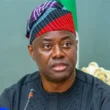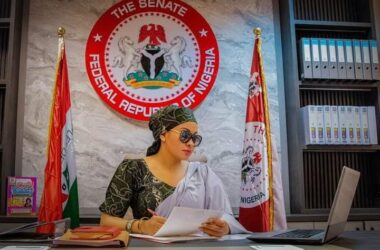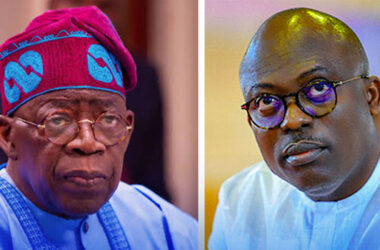The emergence in Nigeria of at least five Fintech giants, with each of them worth at least one billion dollars each, is the result of a deliberate policy of the Buhari presidency and personal inspiration of former Vice President Yemi Osinbajo.
This was disclosed today on INSIDE SOURCES WITH LAOLU AKANDE by Iyinoluwa Aboyeji who co-founded both Flutterwave and Andela two of the FINTECH unicorns.
Aboyeji recalled that he was a member of the Industrial Competitiveness Council which Osinbajo chaired as VP and which developed ideas including a visit to US Silicon Valley from where the funding that birthed the Unicorns emerged.
According to him, the Former CBN Governor “Emefiele is often scorned. Let’s talk the truth, he managed to build a policy environment where Fintech could thrive. With the support of the [Buhari/Osinbajo] administration. They took a nationalistic and patriotic world view.
“And thankfully, we had allies in the administration like Prof [Yemi Osinbajo, the then vice president] who could help us. So, that is what enabled us to grow.
“I remember the time when Prof on a whim took a bunch of ministers to Silcon Valley in 2017. That was a game changer. The money flowed in after that trip. He, in many ways inspired this wave of funding that made us UNICORNS.
“When I was on the Industrial Competitiveness Council, I engaged Prof. Let’s go to Silicon Valley and show the world that Nigerian government will support the digital economy.”
In deed in July 2018, the former Vice President Osinbajo led a delegation of Nigerian government officials, technology entrepreneurs and also private sector players in the entertainment & Creative Economy sectors to the UnitedStates. Aboyeji was on the trip.
Speaking on the outcome of the trip which had stops at the Silicon Valley and also Hollywood both in California, the then VP was quoted as saying there have been active partnerships between Nigerian start-ups and some US tech firms, referring to the Silicon Valley visit which he said, alongside the stop at Hollywood “were extremely successful.”
He said specifically “at the Silicon Valley, Nigerian start-ups got a chance to pitch their products to tech sector investors, that was very good, in fact before we left Silicon Valley, one of our venture platforms was able to sign a deal of about $10m with the Nigerian/US Council, even before we left,” the US.
Reflecting on his success journey in the Digital Economy sector, Aboyeji also said on Inside Sources that in “ 2014 when I first started, if you had told me that I would have helped co-found two UNICORNS, I would have told you that you don’t know what you are talking about.
“But I think there are a few key things that we’ve learned along the journey that made it possible. The first is an enduring belief in Nigerian talents. Andela is a product of the Nigerian talent. With Flutterwave, having a genuine interest in your customers, and making a market by doing things the right way.
Commenting on the future of Nigeria, he observed that “I have a rather unpopular view compared to most people. A lot of young people will tell you they are not optimistic or happy. While I acknowledge that there are a lot of challenges, I have never been more optimistic about the future of this country than I am now. Perhaps it’s because I’m an avid reader of history,”
Aboyeji began, setting the stage for his historical comparison.
Referencing the U.S. economic shift in 1971, Aboyeji recalled how then-President Richard Nixon made the contentious decision to detach the U.S. dollar from the gold standard, a move that initially threw the country into uncertainty.
“That was a tumultuous time for the U.S. economy. The dollar was tied to gold, and people feared the consequences of this move. But if you look at America since 1971, you’ll see it was a turning point,” he explained.
Aboyeji highlighted the technological advancements that followed Nixon’s decision, noting how innovations like the internet, personal computers, and companies like Microsoft (founded in 1975) played critical roles in driving the U.S. into a prolonged era of productivity and prosperity.
“The America of today is a completely different country from what it was in 1971. That decision, although unpopular at the time, helped unleash one of the longest runs of productivity in modern history—50 years of prosperity,” he said.
Drawing a striking parallel, Aboyeji asserted that Nigeria is on the brink of a similar transformation.
“I feel like we are in a 1971 moment in Nigeria. First of all, our currency is cheaper. We have one of the cheapest currencies in the world for the first time, and a lot of young people may not understand the significance of this. Prior to now, what we called prosperity was simply fueling incredible amounts of debt and cheating our children because we were living in an unsustainable economy. The government was taking our oil wealth and subsidizing consumption,” he remarked.
Aboyeji emphasized that Nigeria’s greatest resource is not its oil, but its immense talent. “We are some of the most talented people in the world. That means we have to start thinking differently about our economy,” he argued, shifting the focus away from natural resources to human capital.
One of the key areas Aboyeji believes Nigeria must address is its education system, which he says needs a complete overhaul to focus on talent export. “We need to rejig our education system and orient it towards export. People talk about ‘japa’ like it’s a bad thing. It’s the best thing that has happened to this country,” he said, referring to the growing trend of young Nigerians seeking opportunities abroad.
“There are a lot of young people who would not have jobs if these ‘japa’ people didn’t leave. In fact, there are even more waiting for others to leave so they can get jobs,” he noted.
Aboyeji’s argument challenges the conventional narrative around Nigeria’s brain drain. Rather than viewing it as a loss, he believes it represents an opportunity for the country to position itself as a global talent exporter, similar to nations like India, which has reaped significant benefits from its diaspora.










